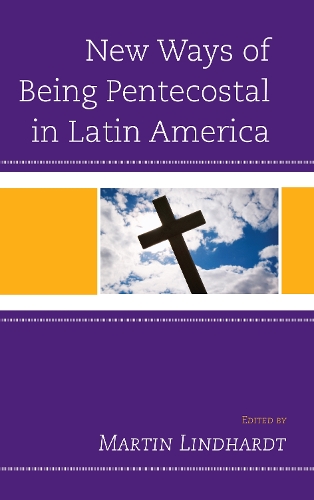
New Ways of Being Pentecostal in Latin America
(Hardback)
Available Formats
Publishing Details
New Ways of Being Pentecostal in Latin America
By (Author) Martin Lindhardt
Contributions by Andrew Chesnut
Contributions by Evguenia Fediakova
Contributions by Virginia Garrard-Burnett
Contributions by Henri Gooren
Contributions by Toomas Gross
Contributions by Stephen Hunt
Contributions by Martin Lindhardt
Contributions by Maria das Dores Campos Machado
Contributions by Bernice Martin
Bloomsbury Publishing PLC
Lexington Books
23rd March 2016
United States
Classifications
Tertiary Education
Non Fiction
History of the Americas
Social groups: religious groups and communities
289.94098
Physical Properties
Hardback
284
Width 158mm, Height 237mm, Spine 26mm
553g
Description
The explosive growth of Pentecostalism has radically transformed Latin Americas religious landscape within the last half century or so. In a region where Catholicism reigned hegemonic for centuries, the expansion of Pentecostalism has now resulted in a situation of religious pluralism and competition, bearing much more resemblance to the United States than to the Iberian motherlands. Furthermore, the fierce competition from Pentecostal churches has inspired significant renewals of Latin American Catholicism, most notably the growth of a Catholic Charismatic movement. However, another and more recent source of religious pluralism and diversity in Latin America is an increasing pluralization and diversification of Pentecostalism itself and of the ways in which individual Pentecostals exercise their faith. By carefully exploring this diversification, the book at hand breaks new ground in the literature on Latin American Christianity. Particular attention is focused on new ways of being Pentecostal and on the consequences of recent transformations of Christianity for individuals, faith communities and societies. More specifically, the chapters of the book look into certain transformations of Pentecostalism such as: theological renewals and new kinds of religious competition between Pentecostal churches; a growing political and civic engagement of Pentecostals; an observed de-institutionalization of Pentecostal religious life and the negotiation individual Pentecostal identities, composed of multiple intra- and extra-ecclesial points of identification; and the emergence of new generations of Pentecostals (children of Pentecostal parents), many of whom have higher levels of education and higher incomes than the previous generations within their churches. In addition, Catholic responses to Pentecostal competition are also addressed in several chapters of the book.
Reviews
This book, which shows how Pentecostalism contributes to the evolution of religious landscape and how it evolves itself, confirms the interest of rigorous analyses to overcome many clichs. [Translated from original French] * Istina *
Over the past generation, Pentecostalism in Latin America has undergone fundamental shifts, as it adapts to hemispheric transformations in class dynamics, generational identities, popular culture, and politics. This important volume grapples deeply with these changes, pushing us to understand them in light of new theoretical insights about conversion, spiritual careers, and the relationship between religion and society. No scholar or journalist interested in Pentecostalism in Latin America will be able to ignore this book. -- John Burdick, Syracuse University
A much-needed exploration of new trends in the pluralization of Latin American religious practice. Lindhardt brings together an impressive array of scholars to explore new Pentecostal and Catholic identities, theological innovations, and the impact of second and third generation converts on their churches and society. The book is a must-read for understanding the complexities of the ongoing pentecostalization of religion in Latin America. -- Timothy J. Steigenga, Florida Atlantic University
Author Bio
Martin Lindhardt is associate professor of cultural sociology at the University of Southern Denmark.
